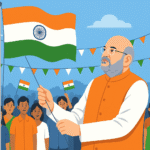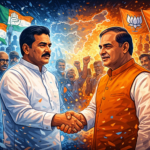For decades, the Indian dream was pretty straightforward: study hard, land a secure job, climb the corporate ladder, and retire at 60. A steady income and a pension were the ultimate safety nets. Few dared to walk away early. That script is now being rewritten — and financial freedom is the pen.
- The Shift: From Safety Nets to Self-Made Freedom
- Meet the New Faces of Financial Freedom
- The Myths They’re Breaking
- The Financial Freedom Formula
- It’s Not Just About the Money
- The Independence Day Connection
- A Reality Check
- The Psychology Behind It
- Steps to Start Your Own Journey
- Breaking the Rat Race Mindset
- Why It’s Becoming Easier (and Harder)
- The Takeaway
The Shift: From Safety Nets to Self-Made Freedom
A new breed of professionals is ditching the predictable path. They’re stepping away from high-pressure jobs in their prime to pursue passion projects, launch creative ventures, or even explore entirely new careers.
And here’s the twist: they’re not running on impulse. This is calculated. It’s planned. It’s disciplined.
They’ve mastered investing, cut out unnecessary expenses, and understood their financial goals down to the last rupee. For them, money isn’t the master — it’s the means. It’s a tool to buy time, choice, and freedom.
Meet the New Faces of Financial Freedom
You’ll find all kinds of stories in this movement:
- A corporate leader who left his cushy job to restore centuries-old inscriptions.
- A young professional who turned a photography hobby into a thriving business.
- A couple who built a multi-crore corpus, reaching FIRE (Financial Independence, Retire Early) years ahead of schedule.
Their “second innings” look nothing alike, but they share one truth: freedom isn’t luck. It’s design. It’s deliberate. It’s well-planned.
The Myths They’re Breaking
One common misconception? That quitting the grind means abandoning financial responsibility. In reality, financial freedom demands more discipline, not less.
It’s not about spending wildly. It’s about knowing exactly what you can spend — and choosing with purpose.
Here’s what these financially free individuals know:
- Clarity Comes First – They track monthly expenses, know every liability, and avoid blind spots in their budgets.
- Growth Assets are Key – They invest in equity and other high-return avenues, balancing risk and reward.
- Passion is a Goal, Not a Hobby – Passion projects are treated as real goals, with a fixed corpus and timeline.
The Financial Freedom Formula
How do they do it? There’s a pattern:
- Build 3–5 Years of Living Expenses: Before making a big leap, they create a cushion that covers all basics.
- Save Before Spending: Prioritising savings over consumption is non-negotiable.
- Live Below Your Means: Not just sometimes, but consistently.
- Plan for the Second Inning: This isn’t just FIRE; it’s about designing life after work so that passion can pay off.
It’s Not Just About the Money
Sure, financial freedom starts with numbers, but it ends with choices. It’s about deciding where you spend your time, not just your cash.
When you’re free from paycheck pressure, you can focus on projects that excite you — whether or not they make a quick buck. You can travel, study, teach, build, or simply slow down.
And in a twist of irony, many people end up earning more post-retirement from passion-driven work than they ever did in their corporate years.
The Independence Day Connection
This Independence Day, the focus isn’t just on political freedom — it’s also on personal economic freedom.
Financial freedom is now showing up in unexpected places:
- Small-town students quietly starting investment journeys.
- People with disabilities breaking barriers in personal finance.
- Middle-aged professionals reinventing their careers midstream.
It’s a revolution, but one that starts in your budget sheet, not on the streets.
A Reality Check
Before you quit your job and book a one-way ticket to the hills, remember: financial freedom is not an overnight phenomenon.
It’s built on:
- Years of saving and investing.
- Saying “no” to unnecessary expenses.
- Choosing growth over instant gratification.
It requires patience, because the aim isn’t just to leave work. It’s to leave work and maintain your lifestyle without sleepless nights about money.
The Psychology Behind It
Most people think the magic number for financial freedom is the total amount of money you have. In truth, it’s about how much you spend — and how little you need to be happy.
If your expenses are low and your investments generate enough returns to cover them, you’re free, regardless of whether your corpus is 50 lakh or 5 crore.
Steps to Start Your Own Journey
- Audit Your Finances
List every expense, debt, and investment. Knowledge is power. - Set Clear Goals
Don’t just say “I want financial freedom.” Decide what it means for you: more travel, early retirement, or part-time work. - Automate Savings
Treat savings like rent — non-negotiable and due every month. - Invest Wisely
Diversify, but make sure growth assets are part of the mix. - Build an Emergency Fund
This is your safety net so you don’t tap into long-term investments during crises. - Keep Learning
The financially free never stop updating their money skills.
Breaking the Rat Race Mindset
The biggest battle in achieving financial freedom isn’t financial — it’s mental. We’ve been conditioned to believe the only safe path is a steady job and a retirement plan at 60.
Breaking free means redefining success. It means accepting that a “less secure” life on paper may be richer in experience, freedom, and fulfillment.
Why It’s Becoming Easier (and Harder)
Easier because:
- Access to investment tools has exploded.
- Awareness about FIRE and alternative lifestyles is growing.
Harder because:
- Lifestyle inflation tempts you to spend more as you earn more.
- Social media often equates success with luxury, not freedom.
The Takeaway
Financial freedom isn’t about escaping work — it’s about escaping meaningless work.
It’s not a magic trick. It’s math, mindset, and method. And while the journey takes years, the payoff is living life on your own terms.
So, whether your dream is to restore ancient art, start a café, write a book, or just spend more time with your kids, remember: money is the tool. Freedom is the goal.
This Independence Day, maybe it’s time to start planning yours.












